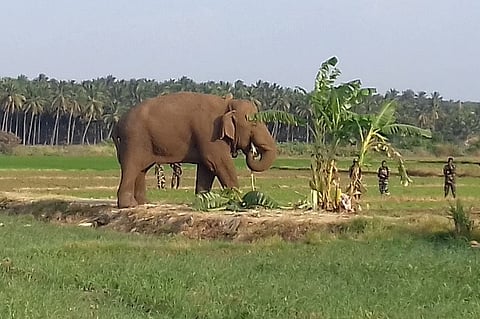

The Tamil Nadu Forest Department on Monday informed the Madras High Court that wild elephant Chinnathambi will be captured and sent to an elephant camp. Sanjay Kumar Srivastava, the Additional Principal Chief Conservator of Forests (Wildlife), appeared in the court on behalf of the Tamil Nadu Forest Department following a petition filed by wildlife activist Arun Prasanna. In his petition, Arun had requested the court to order the department to not convert Chinnathambi into a kumki elephant.
The division bench, consisting of justices S Manikumar and Subramonium Prasad, said that going by the information available in the media, it seems that Chinnathambi’s behaviour is not like that of a wild elephant. They acknowledged that crops were damaged and that the people are scared of the elephant.
Meanwhile, the officer from the Forest Department said that despite attempting to send Chinnathambi back into the forest, it keeps coming back into the village. He also mentioned a report submitted by Ajay Desai, an expert on elephants, which said that since the pachyderm’s behaviour has toned down a lot, it is difficult to drive it into the forest and hence the department would capture Chinnathambi and send him off to camps. Making note of all the submissions, the judges posted the matter for Tuesday.
Arun Prasanna, in his petition, had described in detail, the status of elephants as a species in the country and had also explained the process behind turning a wild elephant into a kumki elephant. Accusing the forest department and the state government of destroying the species, the petition also brought to attention the case of another tusker, Madukkarai Maharaj, which was captured by the department in 2016. The department, in an attempt to turn Maharaj into a kumki elephant, had shut the elephant in a kraal. Maharaj died days later after suffering fractures to its skull, as it had attempted to escape from the wooden enclosure.
Arun Prasanna had also requested the state government and the forest department to form suitable guidelines for elephant translocation and rehabilitation.
‘Need humane, scientific plan for elephants’: PETA
People for Ethical Treatment of Animals (PETA) also wrote to the Principal Chief Conservator of Forests, Tamil Nadu, requesting to formulate guidelines to deal with human-elephant conflict scenarios in the future.
Advocating against the use of force to tame elephants, the letter said, “Elephants are highly intelligent, social animals. In nature, they spend about 18 hours a day walking, feeding, bathing in watering holes, and interacting with other elephants, and females live in close-knit family groups for life. Being able to engage in such behaviour is essential to their psychological and physical wellbeing. Forcing them to live in captivity is inherently cruel, not only for this reason but also because attempts are made to tame them using the threat of fear and pain.”
The letter also gives suggestions that would help in managing human-elephant conflicts, without causing physical or emotional torture to the animal. “We, therefore, request that the Tamil Nadu Forest Department prepare a legally compliant, holistic plan with a humane and scientific approach for Chinnathambi and other elephants. This plan can then be executed effectively by a team of animal-welfare, veterinary, wildlife and transportation experts,” reads the letter.